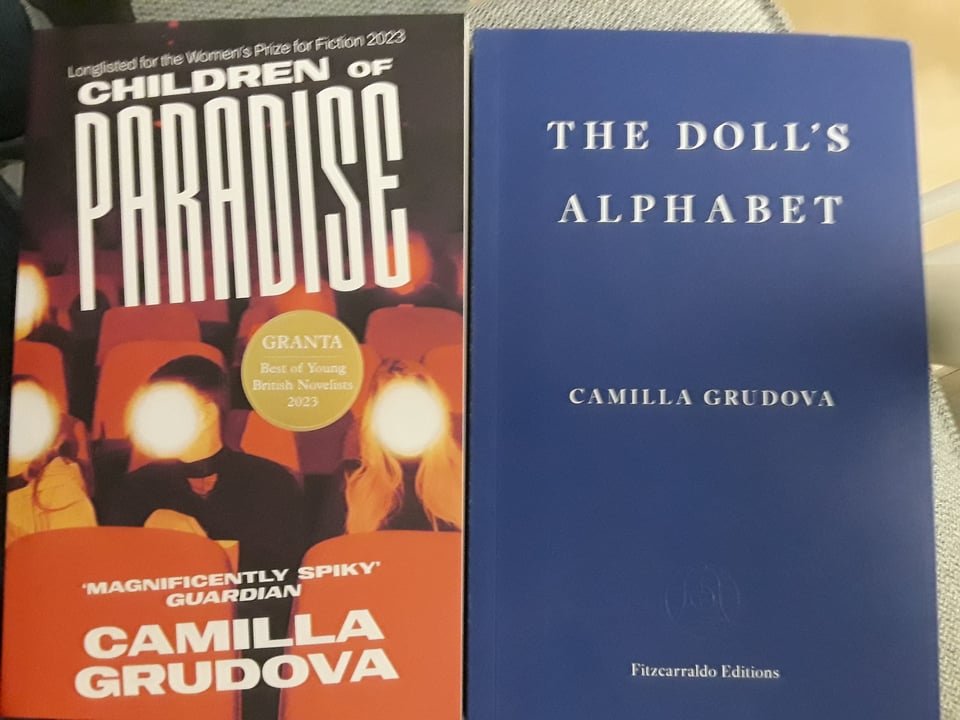SHORT STORY REX April 2024

SHORT STORY REX April 2024
1. “Alabama Circus Punk,” Thomas Ha
More brilliant work from Thomas Ha, this time in ergot. A story that convincingly shows how an Artificial Intelligence might experience the human emotion we call Horror: ie corruption, lost data and that sublime, ghostly yellow spark that separates Human from Machine.
Its refreshing to know that even in the present context where "AI' in all its forms is such a transparent a rip-off, we still get compelling sfnal explorations of the question. They cant take that away from us (yet!)
As in his previous story "The Mub", Ha looks at the push to replace all expressions of humanity (art, literature, interpersonal relationships) with compuerized imitations and asks "seriously guys why tf are we doing this"
2 & 3. “The Passion of Pope Formosus”, LC von Hessen and “Weather Report”, Elena Sichrovsky
Had I had a little more time I might have put together a Holy Week special, and put these two stories alongside "Good Friday, 2033" in last month's newsletter. But I was late in getting around to these recommendations and besides, it's always a good time a little blasphemy, so...the question is, how do you prefer your blasphemy?
Ornate and Gothic and necrophiliac, or fragmented and obsessive and absurd? If the former, LC von Hessen has you covered; if the latter, Sichrovsky. Read both, though, you disgusting sinners.
4. “Nettle Tea”, Camilla Grudova
I am once again recommending you read a Camilla Grudova story in Granta. The hallmarks of previous stories like “Waxy” or “Ivey” are once again on display: the grotesque representation of sexual politics, the oppressive and oddly microcosmic setting, the cataloguing of bizarre and unsavory details (“She had a life ahead of her of eating slugs, tepid half-drunk cans of beer pulled from public bins, the hair clogging drain holes, the custard splotch left by an inebriated person on a cobblestoned street, the undigested, visible comestibles of canine faecal matter”).
It all adds up to as unsettling an examination of lost love as you’re likely to find in the pages of such an august literary institution. Speaking of being published in such an august literary instituion, I experienced a perplexing state of both being both suprised and yet not at all suprised to read Grudova’s recent newsletter entitled “Optimism and Desperation”.
In it, she describes with candor her current financial state and the impossibility of making a living as a writer, even when that writer has been named (as Grudova has) one of Granta's Best of Young British Novelists, received accolades and been translated in various languages, etc.
I am in the bad deep end now. A few weeks ago, I was rejected from a part-time job at Lidl. (I have learned, from my obsession with reading Soviet history books, the best place to work in hard times is a grocery shop) I find myself struggling to find the jobs I always relied on to support my Art as I get older (I could rant for hours of the effect of bartending on the joints) and the market increasingly difficult, the gaps in my CV from residencies and grants which are just as appealing to an employer as a period spent in prison (and they know and I know I might quit if I get money or success, a residency and time) the wage from such jobs not enough to live on these days anyway, though if you have read my books, you can also see that those jobs were a source of inspiration, not just economic necessities that are quickly forgotten.
She goes on to contrast the experiences of Virginia Woolf with those of Barbara Comyns (a writer I have yet to dig into but have been told that I should). “Writer’s biographies are great for writers to read,” Grudova writes, “because it is a how to guide. How to live, how to turn your life into art, what to read, how to not feel like shit when you get a bad review etc, […] Barbara Comyns, like me, was often in the deep end.”
Coincidentally, I went to a bookstore and was pleased to find they had two of her books.

I bought them both. I dunno, seemed like the least I could do. (Currently being delighted by The Doll's Alphabet, “Waxy” even more brutal upon re-reading and “The Mermaid” is another new favorite as well). I encourage you to do the same, fair reader
Self-promo rec: “The Skullhole Panic”
If, after reading “Nettle Tea”, you find yourself jonesing for another story that opens with a character with problems in their romantic relationship meeting an eccentric psychologist and signing up for a very unorthodox type of therapy, why not check out my story “The Skullhole Panic” in issue #4 of Gamut. Try it, you might like it